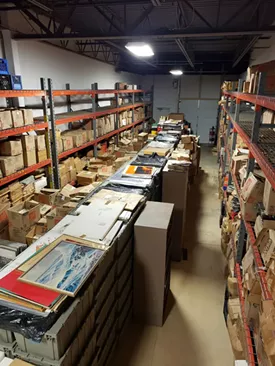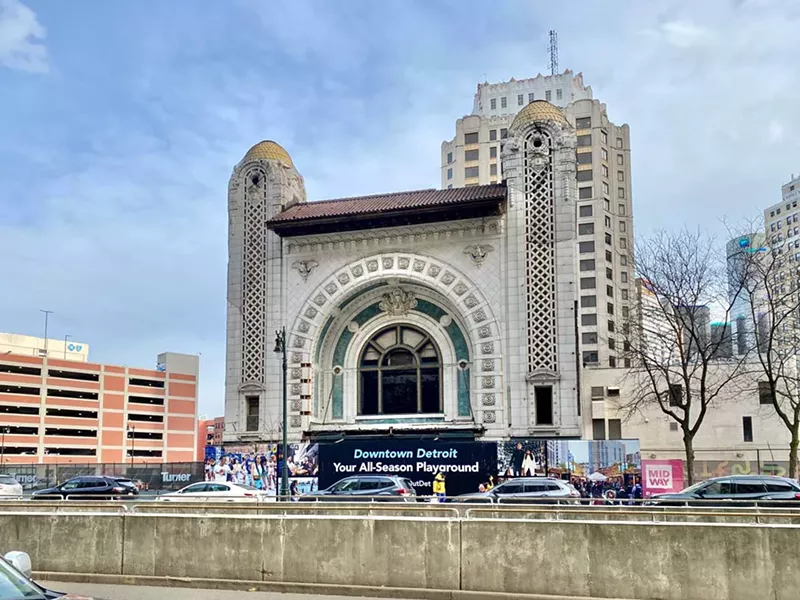A century’s worth of Black film, art, literature, music, and cultural history tucked away in a warehouse just outside of Detroit will soon be shared with the public.
Collected by late Detroiter James E. Wheeler, the extensive archive of over 40,000 artifacts from the 1910s and beyond includes books, vintage posters, lobby cards, vinyl records, photographs, magazines, and more.
After his passing in 2022, Wheeler’s children Alima Wheeler Trapp and Ali J. Wheeler have stepped up with dreams of making their father’s archives accessible to the world.
“We talk about this as a responsibility and a privilege,” Alima says. “Our father committed his life to building this work, and it was very important to him. We want to continue that vision. My brother and I both have sons and the goal is that this is generational. This is a legacy that started with him that we can maximize.”
Alima and Ali founded The Black Canon in 2019, inspired by the definition of canon — a body of influential works in music, literature, or art. Through their parent company and its newer nonprofit arm The Black Canon Collection, they are working to preserve and share their father’s collection.
According to the family, The James E. Wheeler Collection “represents one of the largest Black film and memorabilia collections in the world.”
On October 13, the siblings will host Art of the Ages, a curated exhibition from the collection and inaugural fundraiser featuring brunch, cocktails, a panel discussion, and more. The event will be held at Taylor’d Garden in Livonia, in collaboration with local artists and organizations.
“This, we do feel, is one of the greatest collections never heard of,” Alima says. “I think we have something very special and I think that it should be important to the community … I just feel like this should be a gem of the city.”
While Ali and Alima grew up in Detroit, their father’s love for Black films began in Arkansas, where their grandparents ran a juke joint — an informal bar centered in Black culture and entertainment.
“At the time, you had Hollywood films, and then you had some African Americans and Black people that were making their own films. They had to self-distribute these films,” Ali says, adding, “These films were showing Black people in professional roles as doctors and lawyers, the same type of things you would see in the mainstream movies, but with us in it.”

Courtesy photo
A metro Detroit warehouse is packed with Black historical artifacts, which Ali and Alima are working to organize.
James’s fascination with Black media started at a young age, a passion which only grew after he and his family moved to Detroit during the Great Migration. By the time he passed away, James had filled three storage units, his basement, and various other spaces with his collection.
“My father had collected all these items, but they really weren’t organized in a manner that allows you to utilize it to its fullest potential,” Ali says. “We consolidated it into this warehouse right now, and now we’re going through the overwhelming process of archiving to understand what we have.”
Over the years, The James E. Wheeler Collection has been shown at institutions like The Chicago Museum of Science and Industry, The University of Texas, Harvard University, and the Museum of Modern Art in New York City.
Now, his children hope to expand its reach, making the collection accessible for public education, exhibitions, and research. Their goal is to partner with educators, students, filmmakers, libraries, and anyone else interested in preserving and promoting Black cultural history.
The siblings hope to share their father’s collection with the world through exhibitions at major museums, traveling displays, and digital platforms.
Detroit is just the starting point for The Black Canon’s vision.
The upcoming Art of the Ages event will feature The Black Canon’s first self-curated exhibit of artifacts from the 1910s through the 1990s, illustrating how Black media representation has evolved across decades and artistic mediums.
“We thought it was interesting, when you look at some of the album covers from decades ago, the Black artists weren’t even used in the photography or in the artwork,” Alima says. “They weren’t allowed to be on their own cover. They didn’t think it would be marketable if they were on the cover of the album.”
In addition to the exhibition, attendees can also enjoy silent auctions, brunch, a DJ, and a panel discussion featuring emerging Black artists across literature, film, and music. Motor City Cinema will also screen select films from the collection.
Following the event, Alima and Ali hope to expand the exhibit to larger spaces or even showcase it digitally.
“We’re really looking for the first domino to fall. We’re very flexible,” Alima says. “We’ll continue to build as the archive grows.”
The significance of The Black Canon Collection extends beyond the Wheeler family, however, representing an important contribution to Black cultural history.

Warren LeMay, Flickr Creative Commons
James E. Wheeler was working to display his collection in Detroit’s former National Theatre, but the project never took off. The building was demolished in 2024.
In 1999, James planned to restore Detroit’s National Theatre as a place to show historic films, host film festivals, and display his collection, according to Historic Detroit. Though the plan never materialized and the theater was demolished in early 2024, his children continue to carry a similar torch.
“They actually sold him the National Theatre for like $1 to house the collection,” Ali says. “I’m not sure where everything went wrong after that point, but there was a point where they were going to look at this as ‘OK, we can have the city of Detroit house this.’”
He adds, “We’re rebranding, but we do have some of that same vision, and ideally, this could be a resource for all to enjoy.”
Down the road, a permanent gallery space to house the archive in its entirety would be ideal. For Alima and Ali, Art of the Ages represents just the first step toward broader recognition for their father’s collection.
“We would love the community to come out and support,” Alima says. “We would love to build our network as a result of investing in this exhibit and experience and we would love to have more support on sustaining the collection, whether that be through exhibits or through sponsors or donations.”
Looking ahead, the siblings are focused on completing the archiving process, creating a searchable database of the collection, developing partnerships, and securing funding to fully preserve the collection.
Their long-term hope is for The Black Canon Collection to become a resource for generations to come.
More information on The Black Canon and Art of the Ages can be found at black-canon.com.


